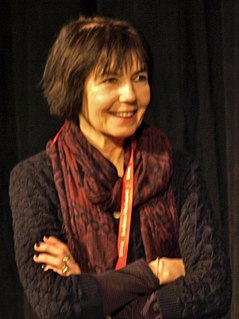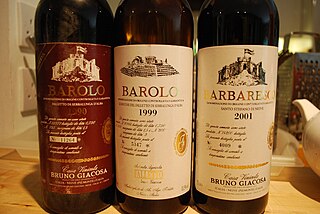
Barolo is a red Denominazione di Origine Controllata e Garantita (DOCG) wine produced in the northern Italian region of Piedmont. It is made from the nebbiolo grape and is often described as one of Italy's greatest wines.

Nebbiolo is an Italian red wine grape variety predominantly associated with its native Piedmont region, where it makes the Denominazione di Origine Controllata e Garantita (DOCG) wines of Barolo, Barbaresco, Roero, Gattinara, Carema and Ghemme. Nebbiolo is thought to derive its name from the Italian nebbia or Piedmontese nebia, meaning "fog". During harvest, which generally takes place late in October, a deep, intense fog sets into the Langhe region where many Nebbiolo vineyards are located. Alternative explanations refers to the fog-like glaucous veil that forms over the berries as they reach maturity, or that perhaps the name is derived instead from the Italian word nobile, meaning noble. Nebbiolo produces lightly-colored red wines which can be highly tannic in youth with scents of tar and roses. As they age, the wines take on a characteristic brick-orange hue at the rim of the glass and mature to reveal other aromas and flavors such as violets, tar, wild herbs, cherries, raspberries, truffles, tobacco, and prunes. Nebbiolo wines can require years of aging to balance the tannins with other characteristics.

Dolcetto is a black Italian wine grape variety widely grown in the Piedmont region of northwest Italy. The Italian word dolcetto means "little sweet one", but it is not certain that the name originally carried any reference to the grape’s sugar levels: it is possible that it derives from the name of the hills where the vine is cultivated. In any case the wines produced are nearly always dry. They can be tannic and fruity with moderate, or decidedly low, levels of acidity and are typically meant to be consumed within a few years after release.

The Langhe is a hilly area to the south and east of the river Tanaro in the province of Cuneo and in the province of Asti in Piedmont, northern Italy.

Italian wine is produced in every region of Italy, home to some of the oldest wine-producing regions in the world. Italy is the world's largest producer of wine, with an area of 702,000 hectares under vineyard cultivation, and contributing a 2013–2017 annual average of 48.3 million hl of wine. In 2018 Italy accounted for 19 per cent of global production, ahead of France and Spain. Italian wine is both exported around the world and popular domestically among Italians, who consume an average of 42 litres per capita, ranking fifth in world wine consumption.

Kim Longinotto is a British documentary film maker, well known for making films that highlight the plight of female victims of oppression or discrimination. Longinotto has made more than 20 films, usually featuring inspiring women and girls at their core. Her subjects have included female genital mutilation in Kenya, women standing up to rapists in India, and the story of Salma, an Indian Muslim woman who smuggled poetry out to the world while locked up by her family for decades.

Barbaresco is an Italian wine made with the Nebbiolo grape. Barbaresco is produced in the Piedmont region in an area of the Langhe immediately to the east of Alba and specifically in the comunes of Barbaresco, Treiso and Neive plus that area of the frazione San Rocco Seno d'Elvio which was once part of the comune of Barbaresco and now belongs to the comune of Alba. It was granted Denominazione di origine controllata (DOC) status in 1966 and Denominazione di Origine Controllata e Garantita status in 1980. The wine is often compared with Barolo—another Nebbiolo based wine from the Piedmont area. Though the wines do share many similarities, there are some distinct differences between them.
The Hot Docs Canadian International Documentary Festival is the largest documentary festival in North America. The event takes place annually in Toronto, Ontario, Canada. The 27th edition of the festival took place online throughout May and June 2020. In addition to the annual festival, Hot Docs owns and operates the Hot Docs Ted Rogers Cinema, administers multiple production funds, and runs year-round screening programs including Doc Soup and Hot Docs Showcase.
Freisa is a red Italian wine grape variety grown in the Piedmont region of north-west Italy, primarily in Monferrato and in the Langhe, but also further north in the provinces of Turin and Biella. Freisa is a vigorous and productive vine whose round, blue-black grapes are harvested in early October. The three-lobed leaves are relatively small and the bunches are elongated in form. By the 1880s it had become one of the major Piedmontese grapes, and in that period its cultivation was stimulated by the vine’s resistance to the downy mildew caused by the Plasmopara viticola fungus. Wines made from the Freisa grape are red and usually somewhat sweet and lightly sparkling, or foaming. Still and fully sparkling versions are also produced, however, as are dry and more decidedly sweet styles. In the Canavese there is also a rosé which can be made primarily from Freisa according to Denominazione di origine controllata (DOC) regulations.

Piemonte wine is the range of Italian wines made in the region of Piedmont in the northwestern corner of Italy. The best-known wines from the region include Barolo and Barbaresco. They are made from the Nebbiolo grape. These wines are ideal for storage and a well-aged Barolo for instance may leave a feeling of drinking velvet because the tannins are polished and integrated more and more into the wine. As the wine matures the colour becomes more brownish and rust-red.

Arneis is a white Italian wine grape variety originating from Piedmont, Italy. It is most commonly found in the hills of the Roero, northwest of Alba, where it is part of the white Denominazione di Origine Controllata e Garantita (DOCG) wines of Roero. It can also be used to produce DOC wines in Langhe. Arneis is so called because it is regarded as a somewhat difficult variety to grow. It is a crisp and floral varietal, and has been grown for centuries in the region. The white wines made from the Arneis grape tend to be dry and full bodied with notes of pears and apricots.

Gaja is an Italian wine producer from the Piemonte region in the district of Langhe, chiefly producing a number of Barbaresco and Barolo wines, and later diversified into Brunello and "Super-Tuscan" production. Its current owner and president Angelo Gaja is credited with developing techniques that have revolutionised winemaking in Italy, and terms such as "the undisputed king of Barbaresco", and "the man who dragged Piedmont into the modern world" have been applied to him, and whose Barbaresco wine is considered a status symbol on a par with Château Lafite-Rothschild or Krug.

Bruno Giacosa was an Italian wine producer from the village Neive in the Langhe region (Piemonte), who produced a number of Barbaresco and Barolo wines, as well as bottlings of Arneis, Barbera, Dolcetto and a sparkling wine. Wines produced from owned vineyards are bottled under the label Azienda Agricola Falletto , wines from bought grapes or from grapes from leased vineyards under the label Casa Vinicola Bruno Giacosa. In terms of the production of Nebbiolo, Giacosa was considered a traditionalist. He has been described as the "Genius of Neive".

Giacomo Conterno is an Italian wine producer from the Piemonte region in the district of Langhe. From a winery located in Monforte d'Alba, the Barolo and Barbera wines are made by traditionalist methods and are widely considered among the finest produced in the Barolo zone.

Space Tourists is a feature-length documentary of the Swiss director Christian Frei. The film had its premiere at the Zurich Film Festival in 2009 and has won the "World Cinema Directing Award" at the Sundance Film Festival in 2010.

Ky Dickens is a filmmaker, writer and director best known for her documentaries Zero Weeks, Sole Survivor, The City That Sold America and Fish out of Water.
Louise Lemoine is a French video artist and filmmaker. She is an associate of the film production and publishing company Bêka & Partners.

Terre del Barolo is a cooperative winery based in Castiglione Falletto, in the Langhe area of northern Italy, renowned for the production of the main Piedmontese wines. Founded in 1958, Cantina Terre del Barolo is one of the most historic cooperative wineries still active in Piedmont.
The Hot Docs Award for Best Canadian Feature Documentary is an annual Canadian film award, presented by the Hot Docs Canadian International Documentary Festival to the film selected by jury members as the year's best Canadian feature film in the festival program. The award was presented for the first time in 1998; prior to that year, awards were presented in various genre categories, but no special distinction for Canadian films was presented. The award is sponsored by the Documentary Organization of Canada and Telefilm Canada, and carries a cash prize of $10,000.















